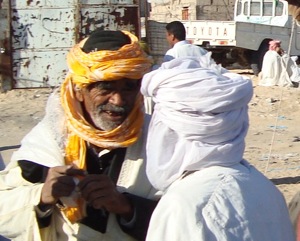An adapted version of this article, written by Culturissima's managing director, Dr David Winter, was first published in History Today Magazine.
 |
| He bites |
Few countries have had such a profound impact on anyone at Culturissima as Libya. Tripoli, where I'm sipping a mint tea in a semi-derelict café just off Green Square, isn't a particular favourite - too many cars, too many bureaucrats, too many nondescript blocks of offices - but the rest of the country... it's just fabulous.
 |
| Swimming in the Sahara |
The most striking aspect of Libya, besides its vastness (it takes nearly a whole day, for example, simply to drive along the Mediterranean across the Gulf of Sirte), is the friendliness and openness of the people, their kindness and their readiness to smile and engage in conversation. “Dog-faced” they’re not.
I find myself here for three reasons: first, since I was a child I have loved North Africa, and Algeria in particular. Trouble is, it’s a bit too dangerous to go to Algeria at the moment (at the time this article was written, May 2008) , so Libya – in spite of its reputation! – seemed a good second choice. I guess that’s another one of the reasons why I’m here: no one has a good word to say about the country… so why not come and see for myself?
And finally, as a lapsed Classicist who spent nearly half of his life studying Greek and Latin, how could I refuse the offer to accompany a handful of historians to the sites of ancient Libya, in particular those magna opera, Sabratha and Leptis Magna?
 |
| He doesn't bite |
Ask yourself this: can you think of any country that has been as insidiously daemonised as Libya over the past few decades? In the modern era, Libyans have learnt that, courtesy of Mr Bush's government, they inhabit a land “beyond the Axis of Evil”. Going further back into the annals, most histories of the Great Socialist People's Libyan Arab Jamahiriya begin with Herodotus’ 5th century BC account of a land of “dog-faced creatures and creatures without heads, their eyes in their breasts”.
"Get your head around this", suggests Beni, my London-educated, Tripoli-born colleague: "You wake up one morning, just like any other morning, you're having a fag, you turn the radio on - and wham! - you're informed by the BBC that you're part of the 'axis of evil'. That's worse than learning the tube is on strike as you're munching your bowl of Frosties, I can tell you."
Beni, like his parents and his parents’ parents, has seen it all before, though. From 1922 onwards Mussolini, driven partly by a nostalgia for Italy’s Classical inheritance and partly by a need to house the peninsula's expanding population, embarked on a “civilising” mission to make Libya Italy’s “fourth shore”. Anything ancient Rome could do, Mussolini could do better: a dozen years later a new country with a new name had emerged under Italian rule - “Libya”, an amalgam of the traditionally disparate regions of Tripolitania, Cyrenaica and Fezzan.
 |
| Giacometti in the Sahara? |
Even though a late entrant in the North African colonial race, Italy managed to leave its mark on Beni's homeland. As the self-styled "protector of Islam", Mussolini let Italian aircraft loose on Libyan horsemen; when that failed, Il Duce savaged the territory with deliberate starvation, sowed the country with concentration camps, deported families en masse, and erected a barbed-wire fence stretching 200 miles along the border with Egypt.
"So you see", suggested Beni, "We Libyans look on your - the West's - mistrust of all things Libyan with a little bit of irony. American and UN sanctions? No worse than the Italians starving my brothers to death. Trying to murder Colonel Gaddafi? The hero of our revolution - Omar al Mukhtar - he was hanged in public in front of 20,000 of loyal followers".
"Does President Reagan really think that we Libyan savages are quivering in our sandals when he rants ‘You can run but you can't hide'? Your friends the Americans can bomb the buggery out of Benghazi if they want - when the Italians were here, they killed one in four of my brothers and sisters".
And he's right, is Beni. When Libya finally came of age as an independent nation in 1951, it was a country on its knees, with an infant mortality rate of 40 per cent and an illiteracy rate of over 90 per cent. The very act of autonomy was riddled with Western caprice: an independent Libya was a way of ensuring that British and American troops could be installed on Libyan territory - although for most Libyans this was preferable to one of the alternatives proposed: that France be granted stewardship of Fezzan and Britain be awarded Cyrenaica. Most astonishingly in view of her history of barbarity, Italy was initially granted Tripolitania.
Anyway, I’m on my way to the south, to the Akakus, where I can forget about Europe's colonial past. The Akakus is a Saharan landscape of soaring dunes and colossal rock formations – rough arches, steep gorges and buttressed mountains. This remote terrain, ineffably beautiful, is studded with thousands of lonely rock carvings - alligators and elephants, giraffes and buffalos (see photos) - that date back as far as 12,000 B.C. Arid and ancient, the Akakus was once the dwelling place of Herodotus’ Garamantes, whilst today the nomadic, indigo-veiled Tuareg still wander across the vast expanses close to the frontier with Algeria and Niger.
So you see, these mythical concoctions mask a tragic reality: Libya is a land whose ineffable beauty - from Leptis to the Sahara - has no need of mythologising.

























